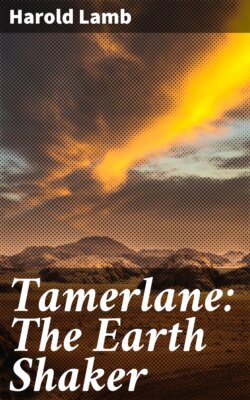Читать книгу Tamerlane: The Earth Shaker - Harold Lamb - Страница 3
На сайте Литреса книга снята с продажи.
CHAPTER I
BEYOND THE RIVER
ОглавлениеTable of Contents
“It is,” the good knight Clavijo said, “one of the four rivers that flow out of Paradise. And the country is very bright, gay and beautiful.”
A cloudless sky overhead—blue ridges of mountains in the distance, rising to the snow peak that was called the Majesty of Solomon. The rolling foothills were covered with meadows, and the streams raced down still cold from the chill of the higher ranges. In these uplands sheep grazed, watched by shepherds on shaggy ponies. Cattle clustered lower down in the lush grass of the glens near the villages.
The river twisted among masses of limestone. More sedately it flowed out into a long valley dark with mulberry trees and the tangle of vineyards. Channels led from it into fields of rice and melons and rolling barley—irrigation ditches where creaking wheels raised the water slowly.
They called the river the Amu. And it had been from time immemorial the border between Iran and Turan—between south and north. To the south lay Khorassan, the Land of the Sun where the Iranians spoke Persian and cultivated the soil. They were wearers of turbans, gentlefolk and beggars of elder Asia.
Beyond, to the north, lay Turan, out of the depths of which the nomads had come, the cattle-breeding, horse-raising races—the helmeted men. Except for the river, there was no frontier. The land to the north of the river was called Ma-vara’n-nahr, Beyond the River.
Hither, the traveller crossed the river, to go to Samarkand. He threaded through gullies and a dense oak forest and entered the maw of a gorge where ridged sandstone walls rose six hundred feet overhead and echoes mocked him. In the gloom of this red defile—they called it the Iron Gate—in a place where no more than two laden camels could pass, dark-faced men leaned on their spears and looked at the travellers.
They were large men, with thin moustaches that fell to their wide chins; they spoke slowly, drawling their words; and they wore chain armour, their helmets crested with horsetails, and they were the guards of Tatary.[1]
The first caravan sarai beyond the Iron Gate was a fertile spot with a small river of its own, shut in by hills. They had named it the Green City. Around it ran a moat filled with water, and through the mesh of blossoming fig and apricot trees uprose the white domes of tombs, and spearlike minarets that served also for watch towers.
In the Green City Tamerlane was born, and he loved it. His home was a house of wood and unburned clay, with a walled courtyard and a garden within the wall. It had a flat roof with a parapet, where a boy could lie unseen and listen at dusk to the muezzin’s long call to prayer, while the sheep and the cattle were driven in from the fields.
Here, too, came bearded men in flaming silk robes who spread their sleeping rugs and talked of caravans and happenings, and always of war. For the shadow of war lay over the valley of the Green City.
“Erein mor nigen bui”—Tamerlane heard this phrase often. “A man’s path is only one.”
He did not bother his head about it much—or the gravely intoned verses from the Koran. The words of the elder men were law, but the boys liked to watch their weapons, and speculate upon the cutting edge of a sheathed tulwar, or the meaning of a broken spear-shaft.
These boys grew up among horses, and matched their steeds in the clover meadows across the Samarkand road. With their bows they hunted quail and foxes, and their trophies they kept in a castle of their own among rocks beneath the overhanging of a cliff. Here they played at siege, while their dogs slept and the horses grazed. Tamerlane was the leader—he had no more than three or four companions—in this game of mimic war.
He was gravely purposeful in play, and he never laughed. Although his horses were not as good as some of the others, he was the best rider of his troupe. And when they were old enough to be given hunting-swords, he soon established his mastery with the weapons.
Perhaps this seriousness was bred of his near-solitude. His mother died while he was young, and his father, a chieftain of the Barlas Tatars, spent most of his hours in talk with the green-turbaned holy men who had visited the shrines of Islam and gained sanctity thereby. The son had his falcons, his dogs and his companions. But there were only two servitors in the house and the horses did not fill half the stable. The father was not a reigning chieftain; he came of a line of men distinguished in war, but he was poor.
The boy rode afield and sat much in his eyrie, looking at the Samarkand road. Down this highway rode cavalcades of wealthy Persians, with armed guards about their veiled women—the Tatar women did not veil. Lean Arab traders escorted horse trains, with loads of brocades from Cathay and raw silk and rugs from the northern looms. Moving through the yellow dust came also slave caravans, and beggars with staff and bowl, and holy men looking for disciples.
At times there appeared a Jew with his mules or a slender Hindu voicing tales of Afghan robbers. At the hour of dusk they raised their tents among the animals and the cook fires that smelled of dung and wormwood. And, kneeling and sitting back on his heels outside their circle, Tamerlane listened to their talk of prices and the world of Samarkand. When his father scolded him for sitting with the caravan men, he made answer.
“A man’s path is only one.”
[1] See Note IX, p. 262.
